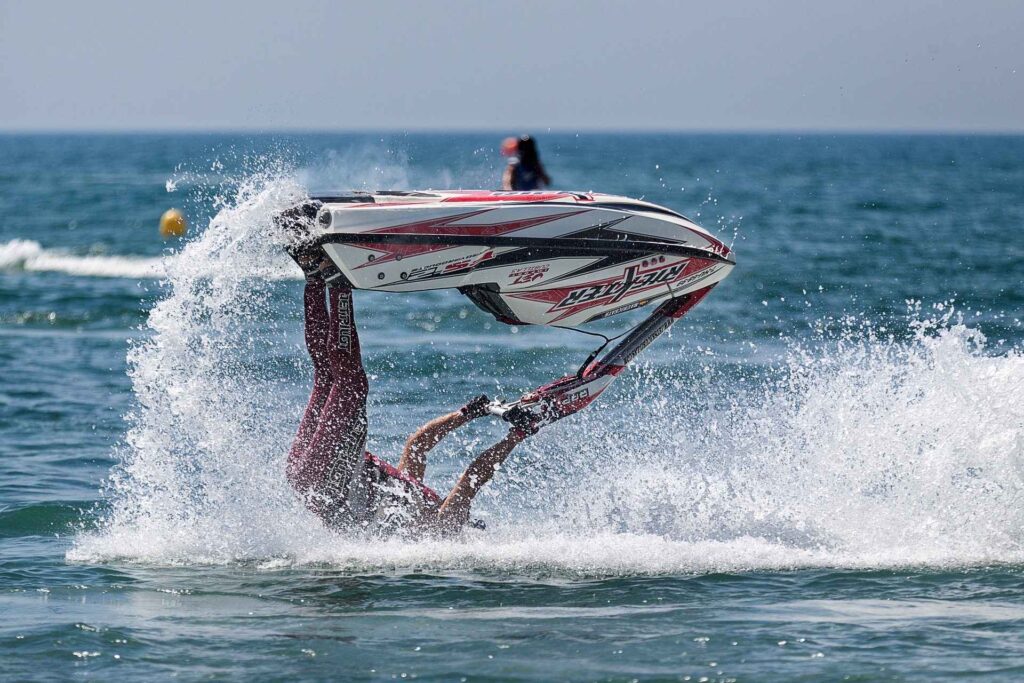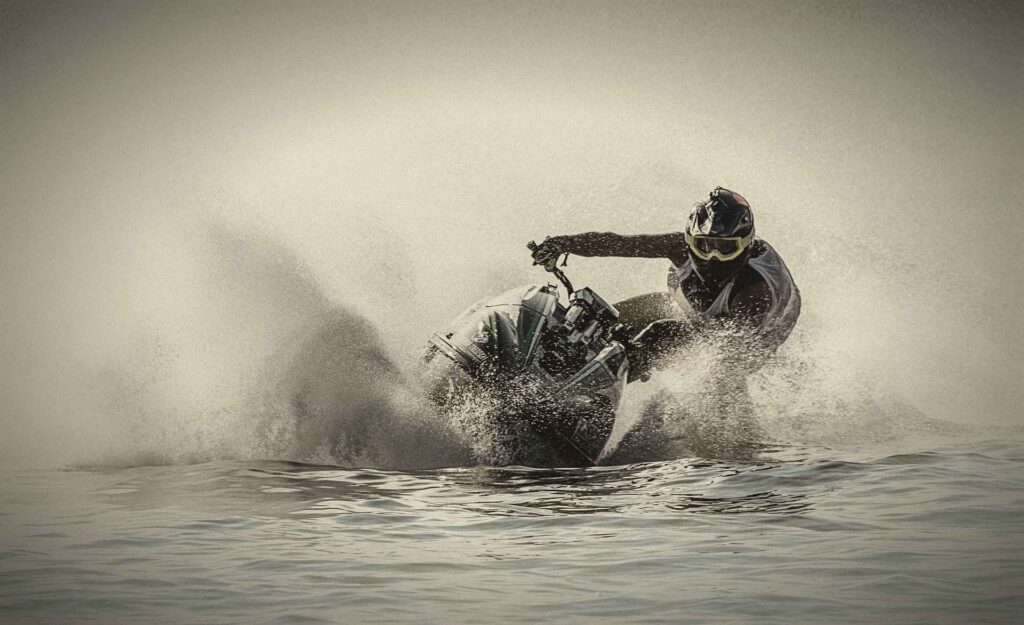The number of registered recreational watercraft in the US increases every year. In 2021, the Coast Guard reported almost 12 million recreational boating vessels registered nationwide.
However, the growing popularity of such a pastime has also resulted in an upward trend in boating accidents. In 2021, the United States Coast Guard (USCG) logged 4,439 accidents with 658 fatalities. These recreational boating accidents also resulted in 2,641 injuries and at least $67.5 million in property damage.
Approximately 20 percent of these accidents involved personal watercraft (PWC) like jet skis and waverunners. PWCs are the second most common vessel type in reported accidents after open motorboats.
Jet ski operators are fully exposed to the elements, so they are more at risk of sustaining injuries. Furthermore, many who try their hand at the popular water activity have little or no experience operating jet skis. These factors contribute to situations that can lead to precarious and life-threatening incidents.
If you were in a jet ski accident, you must seek legal advice from a personal injury lawyer. Usually, law firms offer a free consultation to accident victims to review their cases. Legal representation increases your chances of recovering maximum and immediate compensation for your losses.
Key Takeaways
|
Overview of Recreational Boating Vessels
The USCG defines personal watercraft as vessels less than 16 feet long, like waverunners and jet skis. Moreover, its operation requires a person to stand, sit or kneel on the craft.
The USCG categorizes personal watercraft as a class A inboard boat and must obey maritime laws. Operators must register the jet ski and keep the documentation on board when the craft is in use. The USCG also requires the watercraft to have its registration and hull identification numbers visible.
Generally, people use PWCs for sports or recreational activities. Personal watercraft racing is a popular sport where operators complete a certain number of laps on a set course. However, PWCs also have several other uses apart from leisure.
For example, people use PWCs for offshore fishing as they are more cost effective than traditional fishing boats. It is also an efficient tool for lifeguarding, as it allows rescuers to reach farther in less time.
Likewise, its efficiency proves to be helpful in law enforcement as maritime patrol vessels. When the workforce is limited, one officer can successfully operate a PWC to resolve immediate concerns.
Establishing Negligence in Jet Ski Accidents
An accident victim must file a negligence claim after a jet ski accident to recover their losses. However, four key factors must be present to establish negligence in a case. These are the duty of care, breach of duty, damage or injury, and foreseeable harm.
For instance, all jet ski operators must ride reasonably and safely. Boaters must exercise care to avoid boating accidents that may injure others.
Suppose they breached the duty of care and collided with another boat or PWC because of a reckless operation. The result is serious injuries like lacerations or broken bones to the victims. In this case, the boat operator may be liable for the incident and must compensate for the victim’s injuries. In addition, they must pay for any property damage incurred from the incident.
However, for the claim to be successful, the claimant must establish one more thing. They must prove they were unlikely to suffer injuries but for the negligent act of the liable party.
Liability in Boating Accidents


Depending on various factors, several parties may be liable for a boating or jet ski accident. It includes the jet ski operator, owner, rental or sales company, and other boat riders.
- The jet ski operator would be at fault for a boating accident if an operator’s error or inexperience caused the accident. Suppose they were riding at an excessive speed or while intoxicated and lost control of the vessel. Then the operator is liable for their injuries and losses.
- The boat owner may share liability under various conditions. For instance, they are at fault if they allow the rider to operate a PWC knowing the unsafe water conditions. In addition, suppose they knew that the jet ski operator was intoxicated and still let them use the PWC. Then they are partly liable for the incident and may have to pay for damages.
- A boat rental or sales company is responsible for ensuring their vehicles are properly maintained and safe. If a machinery failure caused the incident, they might share liability for the boating accident. Suppose a design or manufacturing defect injures the jet ski operator. Then the accident victim may file a case against the personal watercraft manufacturer.
However, remember that general rules only apply to some cases. Suppose a jet ski renter signed a liability release waiver before the accident. Then they may not be eligible to file a claim against the rental company for their jet ski injuries.
How to establish fault in personal injury claims
Accident victims must provide concrete evidence to file personal injury claims successfully. In the case of jet ski accidents, victims must present necessary documentation, such as photos of the accident report.
Section 173.55 of the Code of Federal Regulations describes the reporting obligations for jet ski accidents. The vessel’s operator involved in the accident must report it within prescribed timelines under specific circumstances. If you are not the operator of a PWC, obtain a copy of the report from the operator. You can also report it online with the USCG.
Other possible evidence includes the following:
- Contact information and
insurance policy details of all parties involved - Photographs of the accident, such as injuries, property damage, etc.
- Names and contact details of witnesses
- Medical records and medical bills after the accident happened
- Identification or registration number of all PWCs involved
- A written recollection of the accident victim on how the jet ski accident occurred
Generally, the best approach is to secure available evidence as early as possible. Procedures such as emergency treatment or medical tests taken later might affect your claim’s credibility.
Keep track of doctor’s notes and medication receipts that the
Allocation of fault
Not all accidents can be traced back to a single at-fault party. In some cases, two or more parties might share liability for an incident. In this scenario, the court may employ comparative negligence rules in allocating fault, depending on the state.
The comparative negligence principle reduces the amount of damages an accident victim can recover in a negligence claim. The court will base the distribution of damages on the percentage of fault each party contributed to the accident.
The two types of comparative negligence rules are pure comparative and modified comparative.
Pure comparative fault lets the accident victim recover damages regardless of how much they were at fault for the incident. Suppose an intoxicated jet ski operator was 70 percent at fault for the accident. And the court determined 30 percent of the liability to be on the rental company, which still allowed them to use it. Then the accident victim may still recover 30 percent of the total damages.
Modified comparative fault, on the other hand, puts a cap on the percentage of liability for a claimant to recover damages. They will not receive compensation if the court determines they contributed more than 50 or 51 percent of the fault.
Contributory negligence is another tort principle for fault allocation. Unlike comparative negligence, it does not allow an accident victim to receive compensation if they are at fault in any way. For example, suppose a jet ski operator rode the watercraft during unfavorable weather conditions. Whether another party contributed to the incident or not, the injured party cannot recover compensation for their losses.
Tort rules for fault vary from state to state. Remember to ask your personal injury attorney about this matter during the initial consultation. It ensures that you may claim fair compensation for your accident claim.
Damages To Claim From Recreational Boating Accidents
When accident victims successfully file their personal injury cases, they will be entitled to damages to compensate for their losses. Three types of damages are associated with jet ski accidents: economic, non-economic, and punitive.
Economic damages cover financial losses from the boating accident. They include current and future costs that may burden the accident victim. It consists of the following:
- Medical bills
- Physical therapy
- Rehabilitation
- Lost wages
- Loss of earning capacity
- Future treatment costs
- Funeral costs
- Burial expenses
Non-economic damages encompass emotional distress from the incident, such as the following:
- Emotional pain and suffering
- Loss of enjoyment of life
- Emotional trauma
- Post-traumatic stress disorder
- Mental anguish
- Loss of consortium or companionship
- Loss of financial support
Meanwhile, punitive damages only apply to select cases involving malicious or wanton behavior. The court decides if the at-fault parties warrant additional punishment for their actions.
Did you know?
Most boating and jet ski accidents occur in Florida, where water activities and sports are a year-round attraction. In 2020, the state recorded 836 boating accidents and 79 wrongful deaths. In addition, Florida has the highest number of registered recreational boating vessels.
Hire a Reliable Jet Ski Accident Attorney
Navigating legal processes can be overwhelming, especially if you or a loved one were in a serious boating accident. Ease your mind by seeking legal advice from a competent jet ski accident attorney.
The Personal Injury Center can connect you with lawyers with extensive experience and knowledge in personal injury claims. If you have any concerns, you can browse through our extensive collection of legal articles that provide factual and timely information. They are easy to understand and can answer many questions about your case.
The Personal Injury Center offers a free case evaluation to review your case. Upon request, we can connect you to a trustworthy legal team in your area that will provide legal representation for your case.
Let a jet ski accident lawyer help with your personal injury claim. Visit The Personal Injury Center to find a lawyer for you.
FAQs on Proving Fault and Damages in Jet Ski Accidents
What are the common causes of jet ski accidents?
Various factors contribute to a jet ski accident. However, the most crucial of them is operator inexperience. A jet ski or any personal watercraft can be a complex vehicle to control and operate, especially for an untrained rider.
Other common causes include intoxication, excessive speed, poor weather conditions, and machinery failure.
What is the most dangerous component of a jet ski?
Boaters must exercise caution when operating personal watercraft vessels. However, you should avoid the dangerous components of a jet ski, such as the steering nozzle.
The steering nozzle produces pressurized water while the jet ski is in use. If you accidentally fall off the vessel, swim away as fast as possible. The pressurized water can lead to serious injuries if you are in the water near this part of a jet ski.
How long is the statute of limitations in a jet ski accident claim?
Jet ski accident claims fall under personal injury law. In general, accident victims must file personal injury cases within two years of the accident date. If the claimant fails to do so, they might lose their chance of recovering compensation for their jet ski injuries.
Note that the limit for filing a claim depends on the state. Contact a jet ski accident lawyer as soon as possible.



